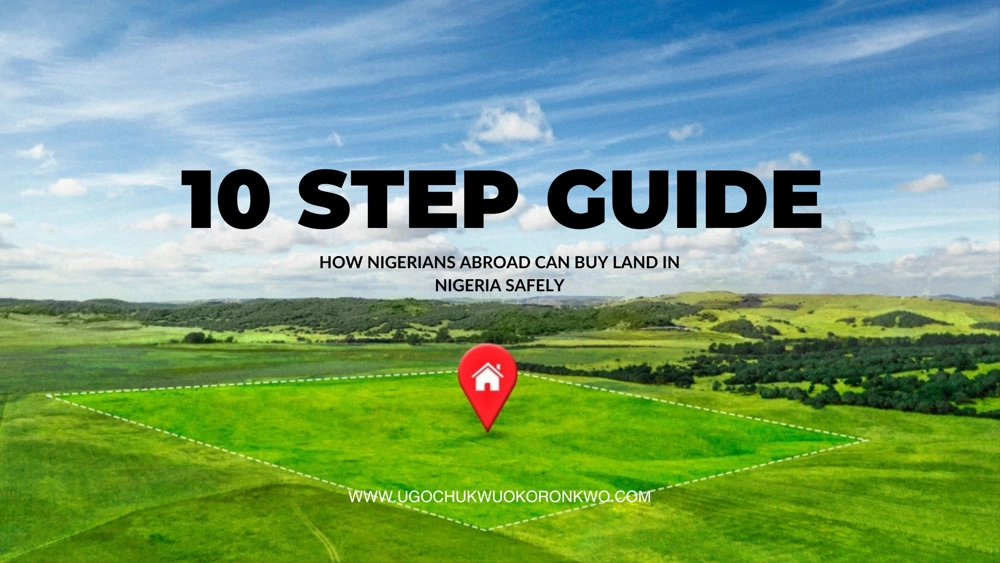
You know, every time I hear stories of Nigerians abroad sending their life savings home for land… only to end up with “imaginary plots” and broken promises, a part of me sighs heavily. Because let’s be honest — buying land in Nigeria while living abroad can sometimes feel like you’re trying to perform magic across two continents. But here’s the good news: it doesn’t have to end in tears.
You can own real land, real property, and real peace of mind — if you follow the right steps.
I’m not here to tell you theory — I’m here to hand you the exact map. Let’s dive in.
🧭 Step 1: Why Are You Buying Land Anyway?
First things first — ask yourself:
“Am I buying land to build my dream house? For investment? For retirement? Or just so I can say ‘I own land in Nigeria’ when my mates are bragging at Christmas?” 😅
Listen, if your “why” is confused, your “what” and “how” will be confused too.
Get clear before you start chasing agents up and down.
💸 Step 2: Budget Beyond the Sweet Price They Tell You
You saw the land for ₦3 million? Cute. Now, add survey fees, deed of assignment, legal fees, maybe estate levies — and you’re dancing close to ₦4 million or more. Don’t let “cheap land” sweet-talk you into emptying your account halfway. Real planning saves real heartache.
👩💼 Step 3: Trust… But Verify (and Verify Again)
If I had a dollar for every time someone said, “My uncle knows a guy…” and ended up crying — I’d own half of Lekki by now. You need a trusted realtor or real estate company that has done actual work — not just vibes and promises. Check reviews. Talk to past clients. Stalk them online if you must (no shame in survival).
📍 Step 4: Options Are Your Best Friend
Never, ever fall in love with the first plot you see. Get at least 3–5 options. Compare locations. Compare documents. Compare your gut feeling. If someone pressures you to “rush rush” — that’s your sign to press brake.
👀 Step 5: Inspection — Even If It’s Virtual
You’re abroad — I get it. But in the age of Zoom, FaceTime, and live walkarounds, there’s no excuse for buying “ghost land.” If you can’t fly in, send a trusted relative AND hire an independent inspector. Trust me, ₦50k for inspection is better than ₦15 million on dashed hopes.
🔍 Step 6: Get Your Lawyer and Surveyor Involved
This step is not optional — unless you enjoy mystery novels. Before you pay a dime, let a lawyer and a licensed surveyor: Verify ownership, check government acquisition status. Confirm that the land isn’t sitting in the middle of a proposed expressway. A little legal drama today saves you from prime-time Nollywood drama tomorrow.
💳 Step 7: Pay Like Someone Who Knows Better
Please… I’m begging you… Never transfer money based on promises. Use a lawyer-drafted Deed of Assignment. Pay into verifiable company accounts. Demand receipts and document every sigh, every handshake, every transfer. This is not “village contribution money” — it’s your future.
📜 Step 8: Go for Physical Allocation
Payment isn’t the end. You need to physically (or via a trusted rep) stand on your plot. Touch the earth. See the beacons. Take selfies if you must, because no plot is yours until they hand it over officially.
🏛️ Step 9: Register That Land in Your Name
If you think having “allocation papers” alone makes you the owner, please… think again. Start your Governor’s Consent or C of O processing. Get your name in government records — so that even if you’re sipping coconut water in Toronto, your land in Nigeria is legally yours.
🛡️ Step 10: Guard It Like Treasure
Last but definitely not least — secure your land. Fence it. Build a signboard. Hire a caretaker if you must. Land in Nigeria is not like fine wine — it doesn’t get better if you leave it alone. Presence is protection.
🎯 Final Thoughts:
Buying land while abroad isn’t a gamble. It’s a journey — one you can complete without regrets if you walk it wisely. Take your time. Follow the process. And please, don’t let fear stop you — but also don’t let excitement blind you. If you ever need a trusted hand to walk you through it, I’m just one message away. Because owning land back home shouldn’t cost you your peace of mind — it should create it.
